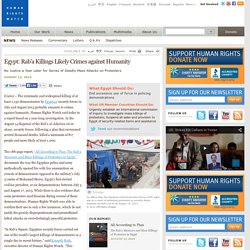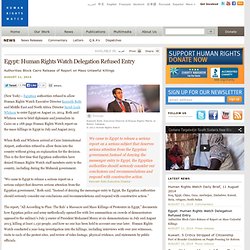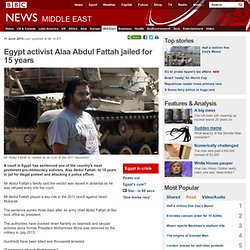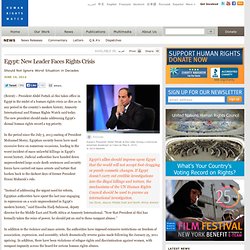

Journalist fined for defamation in Egypt. Cairo, June 18, 2012--The Committee to Protect Journalists condemns the legal action taken against an Egyptian journalist who was fined for defamation, and calls on the appeals court to reverse the ruling.

In an unrelated incident, authorities briefly detained on Saturday an Egyptian journalist covering the run-off to the presidential election. On June 10, Hanan Youssef, the deputy editor-in-chief of the local daily Al-Messa, was fined 10,000 Egyptian pounds (US$1,654) by a Cairo court for defaming the paper's former editor-in-chief, Khaled Imam, Youssef told CPJ. Al-Messa belongs to Dar Al-Tahrir, a state-owned publishing company.
Youssef was part of a group of journalists who had called for a change in the editorial staff of Egypt's state-run newspapers after the January 2011 revolution, she told CPJ. She said that many Egyptian news outlets included staff members who maintained links to the ruling military regime. Egypt: Rab’a Killings Likely Crimes against Humanity. (Cairo) – The systematic and widespread killing of at least 1,150 demonstrators by Egyptian security forces in July and August 2013 probably amounts to crimes against humanity, Human Rights Watch said today in a report based on a year-long investigation.

In the August 14 dispersal of the Rab’a al-Adawiya sit-in alone, security forces, following a plan that envisioned several thousand deaths, killed a minimum of 817 people and more likely at least 1,000. The 188-page report, “All According to Plan: The Rab’a Massacre and Mass Killings of Protesters in Egypt,” documents the way the Egyptian police and army methodically opened fire with live ammunition on crowds of demonstrators opposed to the military’s July 3 ouster of Mohamed Morsy, Egypt’s first elected civilian president, at six demonstrations between July 5 and August 17, 2013.
Human Rights Watch released a video showing the events as they unfolded in Rab’a Square on August 14, including first-hand accounts by witnesses and victims. Egypt: Human Rights Watch Delegation Refused Entry. (New York) – Egyptian authorities refused to allow Human Rights Watch Executive Director Kenneth Roth and Middle East and North Africa Director Sarah Leah Whitson to enter Egypt on August 10, 2014.

Roth and Whitson were to brief diplomats and journalists in Cairo on a 188-page Human Rights Watch report on the mass killings in Egypt in July and August 2013. When Roth and Whitson arrived at Cairo International Airport, authorities refused to allow them into the country without giving an explanation for the decision. This is the first time that Egyptian authorities have denied Human Rights Watch staff members entry to the country, including during the Mubarak government. “We came to Egypt to release a serious report on a serious subject that deserves serious attention from the Egyptian government,” Roth said. “Instead of denying the messenger entry to Egypt, the Egyptian authorities should seriously consider our conclusions and recommendations and respond with constructive action.”
Egypt activist Alaa Abdul Fattah jailed for 15 years. 11 June 2014Last updated at 06:14 ET Mr Abdul Fattah is viewed as an icon of the 2011 revolution A court in Egypt has sentenced one of the country's most prominent pro-democracy activists, Alaa Abdul Fattah, to 15 years in jail for illegal protest and attacking a police officer.

Mr Abdul Fattah's family said the verdict was issued in absentia as he was refused entry into the court. Mr Abdul Fattah played a key role in the 2011 revolt against Hosni Mubarak. The sentence comes three days after ex-army chief Abdul Fattah al-Sisi took office as president. The authorities have cracked down harshly on Islamists and secular activists since former President Mohammed Morsi was removed by the military in July 2013. Hundreds have been killed and thousands arrested. 'Concerns about democracy' Mr Abdul Fattah was arrested in November after taking part in a protest calling for the repeal of a new law that banned unauthorised demonstrations. "Alaa and his lawyers were outside the court. Egypt: New Leader Faces Rights Crisis.
(Beirut) – President Abdel Fattah al-Sisi takes office in Egypt in the midst of a human rights crisis as dire as in any period in the country’s modern history, Amnesty International and Human Rights Watch said today.

The new president should make addressing Egypt’s dismal human rights record a top priority. In the period since the July 3, 2013 ousting of President Mohamed Morsy, Egyptian security forces have used excessive force on numerous occasions, leading to the worst incident of mass unlawful killings in Egypt’s recent history. Judicial authorities have handed down unprecedented large-scale death sentences and security forces have carried out mass arrests and torture that harken back to the darkest days of former President Hosni Mubarak’s rule. In addition to the violence and mass arrests, the authorities have imposed extensive restrictions on freedom of association, expression, and assembly, which dramatically reverse gains made following the January 25, 2011 uprising.